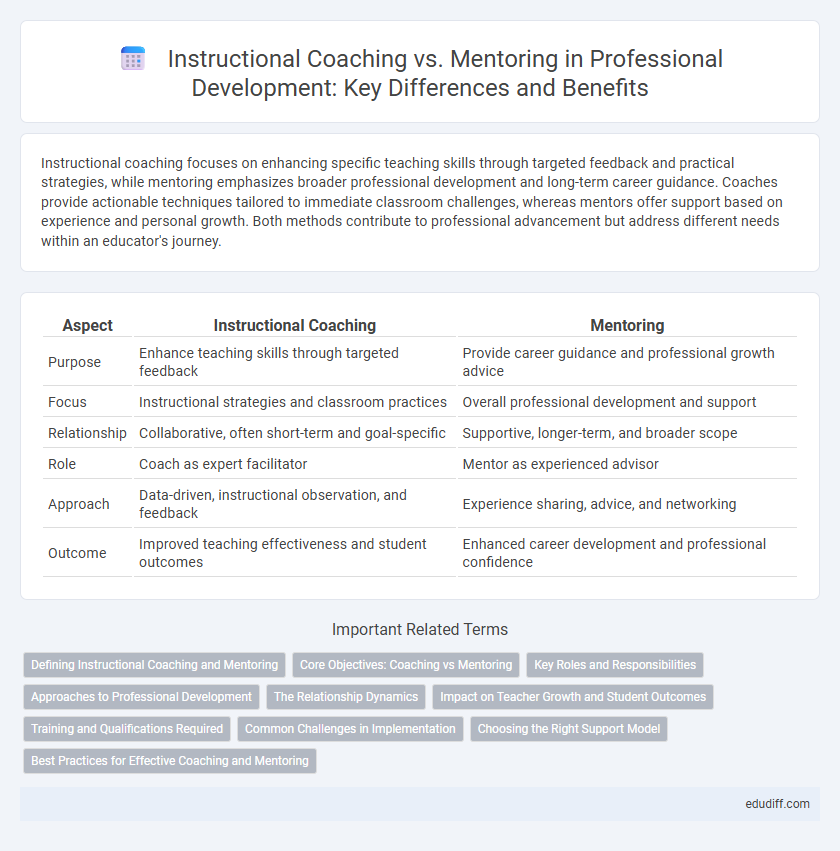Instructional coaching focuses on enhancing specific teaching skills through targeted feedback and practical strategies, while mentoring emphasizes broader professional development and long-term career guidance. Coaches provide actionable techniques tailored to immediate classroom challenges, whereas mentors offer support based on experience and personal growth. Both methods contribute to professional advancement but address different needs within an educator's journey.
Table of Comparison
| Aspect | Instructional Coaching | Mentoring |
|---|---|---|
| Purpose | Enhance teaching skills through targeted feedback | Provide career guidance and professional growth advice |
| Focus | Instructional strategies and classroom practices | Overall professional development and support |
| Relationship | Collaborative, often short-term and goal-specific | Supportive, longer-term, and broader scope |
| Role | Coach as expert facilitator | Mentor as experienced advisor |
| Approach | Data-driven, instructional observation, and feedback | Experience sharing, advice, and networking |
| Outcome | Improved teaching effectiveness and student outcomes | Enhanced career development and professional confidence |
Defining Instructional Coaching and Mentoring
Instructional coaching involves a collaborative, goal-oriented process where coaches support educators in enhancing teaching strategies and improving student outcomes through active observation and feedback. Mentoring is a relationship-based approach that focuses on personal and professional growth by providing guidance, advice, and support from a more experienced educator to a less experienced one. Both practices aim to develop instructional skills but differ in their methods and focus areas, with coaching emphasizing performance improvement and mentoring emphasizing career development.
Core Objectives: Coaching vs Mentoring
Instructional coaching centers on enhancing specific teaching skills through targeted feedback and collaborative goal-setting to improve classroom practice and student outcomes. Mentoring emphasizes holistic professional growth, offering guidance, support, and wisdom based on experience to navigate career development and personal challenges. Both approaches aim to foster educator effectiveness but differ in focus; coaching is skill-driven and short-term, while mentoring is relationship-driven and often long-term.
Key Roles and Responsibilities
Instructional coaching centers on enhancing teaching effectiveness through targeted feedback, modeling instructional strategies, and analyzing student data to improve learning outcomes. Mentoring emphasizes career development by providing guidance, support, and sharing professional experiences to foster growth and confidence in mentees. Both roles demand strong communication skills, but coaching is more data-driven and performance-focused, while mentoring prioritizes relationship-building and personalized professional development.
Approaches to Professional Development
Instructional coaching emphasizes personalized, job-embedded support through real-time classroom observations and feedback to enhance teaching practices. Mentoring centers on ongoing professional guidance, fostering career growth and reflective dialogue between experienced educators and mentees. Both approaches contribute uniquely to professional development by targeting skill refinement and holistic educator growth.
The Relationship Dynamics
Instructional coaching centers on collaborative goal-setting and skill development between coach and educator, emphasizing a non-evaluative, supportive partnership that fosters reflection and growth. Mentoring typically involves a more experienced professional guiding a less experienced individual, often within a hierarchical relationship aimed at career development and personal support. The relationship dynamics in coaching are characterized by mutual learning and shared responsibility, whereas mentoring often features directional guidance and long-term professional nurturing.
Impact on Teacher Growth and Student Outcomes
Instructional coaching directly enhances teacher growth by providing tailored, research-based strategies that improve classroom practice, leading to measurable student achievement gains. Mentoring supports teacher development through experience-sharing and emotional support, which fosters confidence but may have less immediate impact on instructional methods. Combining both approaches creates a robust framework for sustained teacher effectiveness and improved student outcomes.
Training and Qualifications Required
Instructional coaching requires specialized training in adult learning theories, data analysis, and instructional strategies to effectively support teacher development. Mentoring typically involves a combination of professional experience and interpersonal skills, with formal qualifications varying widely by organization. Both roles benefit from ongoing professional development, but instructional coaches often hold advanced certifications or degrees in education or leadership.
Common Challenges in Implementation
Instructional coaching and mentoring both face common implementation challenges such as limited time allocation, inconsistent participation, and unclear role definitions within educational settings. Resistance from educators due to perceived evaluation threats and lack of administrative support often hinders effective collaboration and goal alignment. Addressing these barriers requires structured scheduling, clear communication of objectives, and ongoing professional development to build trust and commitment.
Choosing the Right Support Model
Selecting the appropriate support model between instructional coaching and mentoring depends on the specific needs of educators and institutional goals. Instructional coaching emphasizes targeted skill development through data-driven feedback and collaborative goal setting, ideal for enhancing teaching practices and student outcomes. Mentoring offers holistic professional growth by fostering long-term relationships, guidance, and emotional support, making it suitable for career development and navigating organizational culture.
Best Practices for Effective Coaching and Mentoring
Instructional coaching emphasizes tailored, data-driven feedback and collaborative goal-setting to enhance educators' instructional strategies, while mentoring focuses on relationship-building and holistic professional growth. Best practices for effective coaching and mentoring include establishing trust, maintaining ongoing reflective dialogue, and aligning support with individual needs and institutional goals. Consistent monitoring of progress and adapting approaches based on evidence-based outcomes significantly improves the impact of both practices.
Instructional Coaching vs Mentoring Infographic

 edudiff.com
edudiff.com